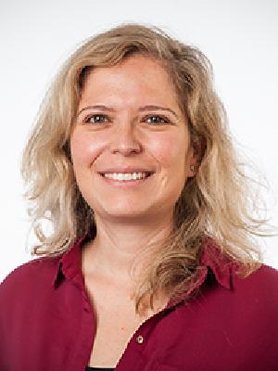

Y. (Yaiza) Gonzalez Garcia
Y. (Yaiza) Gonzalez Garcia
Profiel
Expertise
-Electrochemistry, Micro-electrochemistry, Visualize and monitor in-situ processes related to electrochemistry: corrosion, dissolution, deposition, catalysis.
-Correlation between Microstructure and Corrosion of metals
-Support about micro-electrochemical techniques: SECM, SVET, SIET, SKPFM, microcapillary cell
- Local Evaluation of organic coatings (specially degradation of coatings)
Biografie
Yaiza Gonzalez-Garcia obtained an MSc degree in Chemistry at the Faculty of Chemistry of the University of La Laguna (Spain) in 2003. After this, she received PhD-degree in October 2007 at the same university in the Physical Chemistry department. The Thesis's focus was the novel application of microelectrochemical methods for studying the degradation of (coated)-metals.
She performed post-doc research at Christian-Albrecht University of Kiel (Germany) within the national project “Function by switching” (SFB677). During the same period, she obtained a Humboldt Foundation Post-Doctoral Fellowship (Germany) with the project titled “In situ study of early stages of polyurethane degradation during exposure to the aqueous solution at nanoscopic level”.
In 2010, she started as a post-doc in the Corrosion Technology and Electrochemistry (CTE) group at Delft University of Technology. She focused on the local microelectrochemical evaluation of self-healing coatings within the IOP-Self Healing Materials framework (Project IOP-SHM08740). Later she joined the SURF-group at Vrije University of Brussels (Belgium), where she successfully performed various investigations focused on the simulation of microelectrochemical measurements for corrosion studies. This research was done within the national research project “Design and Prediction of Nanostructured Metal Surfaces (NANOMET).
In July 2014, she was awarded a Delft Technology Fellowship grant and appointed to a tenure-track position in the Department of Materials Science and Engineering.
She is an Associate Professor in the Materials Science and Engineering department. She leads the Localized Corrosion and Electrochemistry team with two main research lines. The first focuses on studying the relationship between the microstructure of metals and corrosion properties. The second research line focuses on the microelectrochemical characterization of materials for diverse applications such as energy storage, art heritage and biomaterials. The application of high-resolution electrochemical methods (based on micro- and nano-sensors) connects both research lines.
Other positions:
· Coordinator of the Master of Materials Science and Engineering
· Director of Studies of the Master of Materials Science and Engineering
· Member of the Board of Administrators of the European Federation of Corrosion (EFC)
Expertise
Publicaties
-
2024
Albumin Protein Impact on Early-Stage In Vitro Biodegradation of Magnesium Alloy (WE43)
Amin Imani / E. Rahimi / Maria Lekka / Francesco Andreatta / Michele Magnan / Y. Gonzalez Garcia / J.M.C. Mol / R. K. Singh Raman / Lorenzo Fedrizzi / Edouard Asselin
-
2024
Atmospheric corrosion of iron under a single droplet
A new systematic multi-electrochemical approach
Ehsan Rahimi / Keer Zhang / Ali Kosari / Nils Van den Steen / Axel Homborg / Herman Terryn / Arjan Mol / Yaiza Gonzalez-Garcia -
2024
Effects of grain boundary chemistry and precipitate structure on intergranular corrosion in Al-Mg-Si alloys doped with Cu and Zn
Emad H. Bartawi / Calin D. Marioara / Ghada Shaban / Ehsan Rahimi / Oleg V. Mishin / Jonas K. Sunde / Yaiza Gonzalez-Garcia / Randi Holmestad / Rajan Ambat
-
2024
Electrodeposited Sn-Cu-Ni alloys as lead-free solders on copper substrate using deep eutectic solvents
The influence of electrodeposition mode on the morphology, composition and corrosion behaviour
Sabrina Patricia State / Stefania Costovici / Mirsajjad Mousavi / Yaiza Gonzalez Garcia / Caterina Zanella / Anca Cojocaru / Liana Anicai / Teodor Visan / Marius Enachescu -
2024
Inhibition of the second phase precipitation and improvement of intergranular corrosion resistance by boron segregation at the grain boundary of S31254 superaustenitic stainless steel
Jian Wang / Zhiqiang Liu / Haiyu Tian / Peide Han / Yaiza Gonzalez-Garcia
-
Nevenwerkzaamheden
-
2022-11-01 - 2024-11-01
Industrie